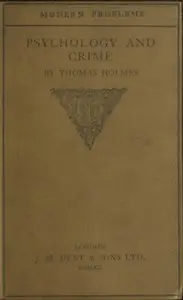"The Measurement of Intelligence: An Explanation of and a Complete Guide for the Use of the Stanford Revision and Extension of the Binet-Simon Intelligence Scale" by Lewis M. Terman is a book from the early 1900s about measuring a person's intelligence. It explains how to use the Stanford version of the Binet-Simon Scale to find out how smart kids and adults are. This book explores how intelligence tests can be used in schools to help kids who struggle with learning, find kids who are really smart, and put students in the right classes. The beginning of the book explains why it is important to use tests to measure how smart someone is, especially when it comes to education. Terman talks about how schools didn't always understand that kids have different smarts and how this caused problems for some students. The goal of the Binet-Simon Scale, and this updated version, is to give teachers and experts a good way to understand what kids can do mentally, so they can help them learn better and address their needs in the classroom using a scientific approach.

The measurement of intelligence : $b an explanation of and a complete guide for the use of the Standard revision and extension of the Binet-Simon intelligence scale
By Lewis M. (Lewis Madison) Terman
Discover how standardized intelligence tests revolutionized education by scientifically evaluating a child's mental abilities and addressing their unique learning needs.
Summary
About the AuthorLewis Madison Terman was an American psychologist, academic, and proponent of eugenics. He was noted as a pioneer in educational psychology in the early 20th century at the Stanford School of Education. Terman is best known for his revision of the Stanford–Binet Intelligence Scales and for initiating the longitudinal study of children with high IQs called the Genetic Studies of Genius. As a prominent eugenicist, he was a member of the Human Betterment Foundation, the American Eugenics Society, and the Eugenics Research Association. He also served as president of the American Psychological Association. A Review of General Psychology survey, published in 2002, ranked Terman as the 72nd most cited psychologist of the 20th century, in a tie with G. Stanley Hall.
Lewis Madison Terman was an American psychologist, academic, and proponent of eugenics. He was noted as a pioneer in educational psychology in the early 20th century at the Stanford School of Education. Terman is best known for his revision of the Stanford–Binet Intelligence Scales and for initiating the longitudinal study of children with high IQs called the Genetic Studies of Genius. As a prominent eugenicist, he was a member of the Human Betterment Foundation, the American Eugenics Society, and the Eugenics Research Association. He also served as president of the American Psychological Association. A Review of General Psychology survey, published in 2002, ranked Terman as the 72nd most cited psychologist of the 20th century, in a tie with G. Stanley Hall.














